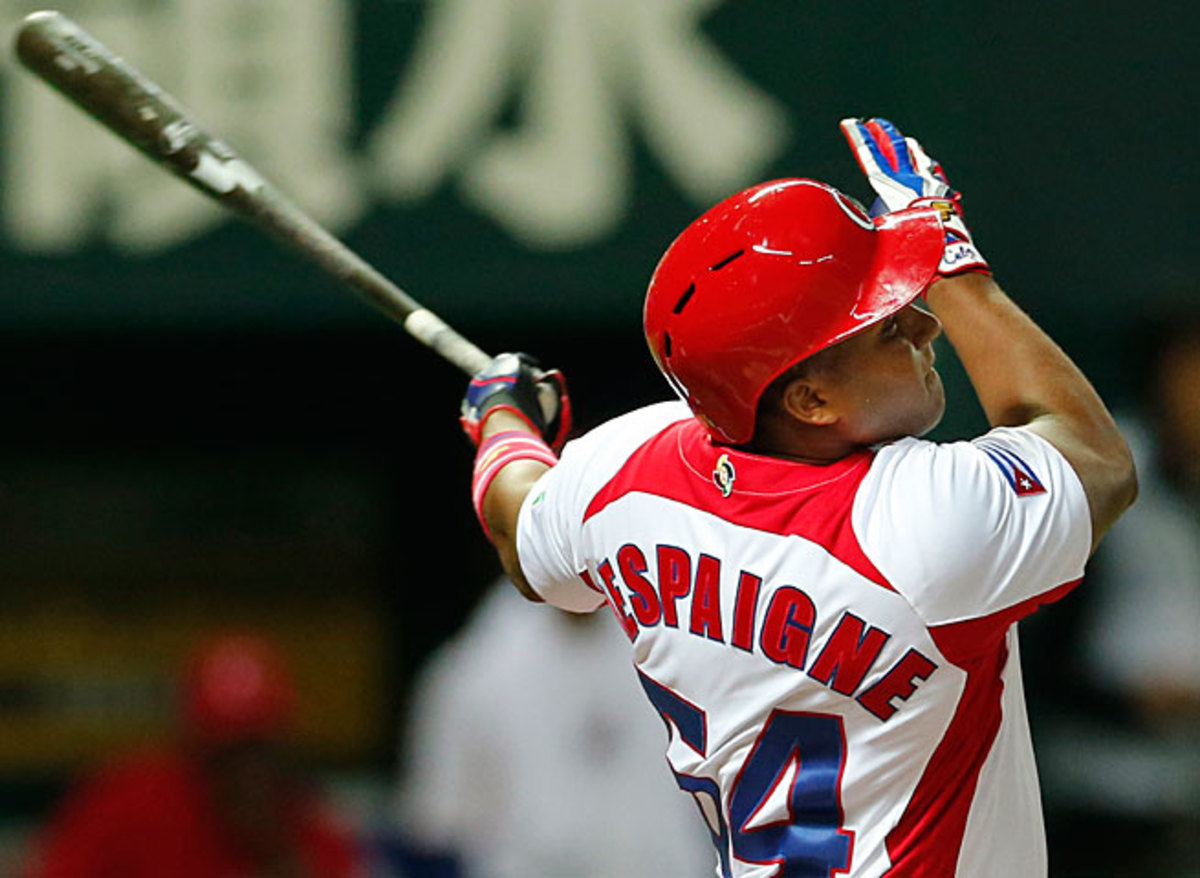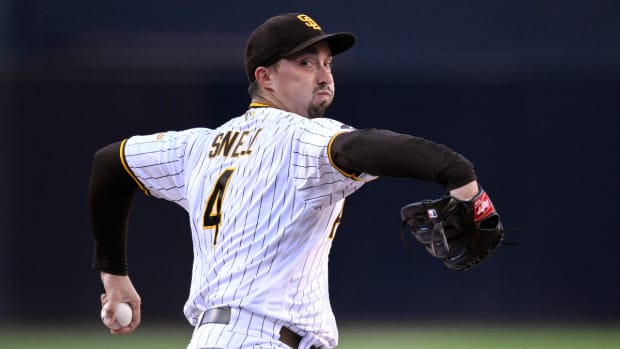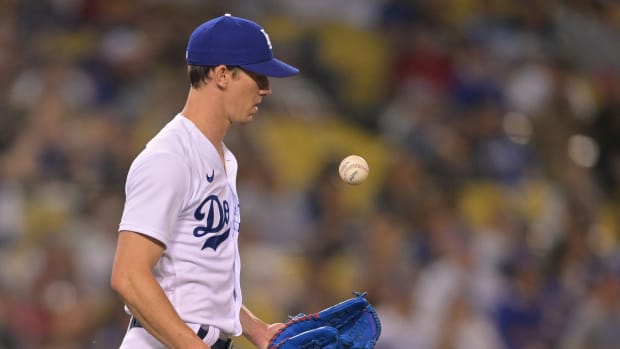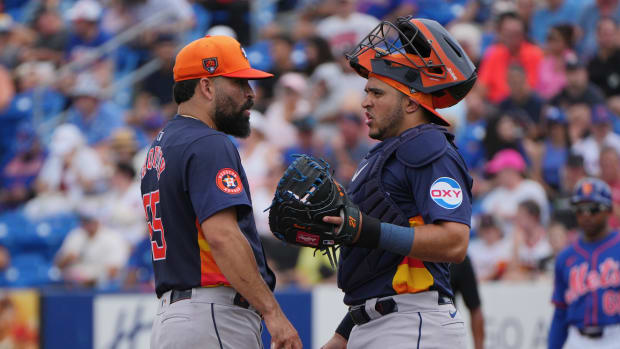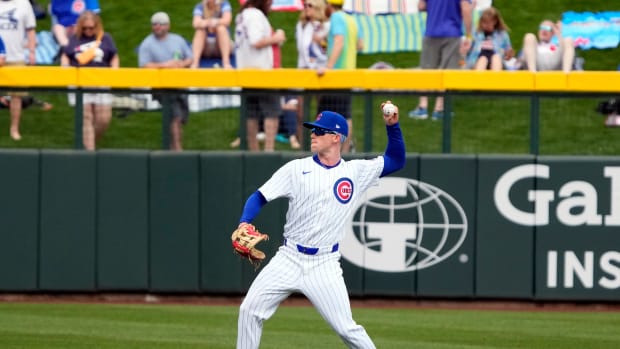Quest for the next Cespedes and why the A's already beat the system

Alfredo Despaigne turned heads with a phenomenal showing for Cuba during the World Baseball Classic.
Koji Sasahara/AP
Had they known then what they know now about Yoenis Cespedes -- that he would become an instant star the moment he stepped onto a major league field last spring, and one who would improve, as says one scout, "minute by minute, not day by day" -- there is no question that virtually every major league club would have eagerly topped the winning four-year, $36 million bid the Oakland A's put on the Cuban defector last February, including the perennially cash-strapped A's themselves.
Cespedes' impact on Oakland, and on the American League, has been profound. In the 149 games that he has played for the A's through Tuesday, they have a record of 96-53. In the 47 games that he has sat out, due mostly to hand injuries, they are 16-31. According Baseball Reference, among players who have accumulated at least 500 plate appearances since Opening Day of 2012, Cespedes's OPS+ of 137 ranks 16th -- ahead of players like Josh Hamilton, Matt Kemp, Joe Mauer and Albert Pujols, each of whom earns at least twice what Cespedes does.
As I detail in my feature on Cespedes in this week's issue of Sports Illustrated, the A's, and not one of the big-moneyed usual suspects, ended up with him for several reasons. One was that they put in the scouting work to a degree that almost no other club did, paying to send talent evaluators who could not enter Cuba to watch him play professionally around the globe, so as not to miss a single international tournament at-bat of his for three years. Another was that they had the analytical framework in place to process the reports they got back, devised centrally by director of baseball operations (and Cal-Berkeley economics Ph.D.) Farhan Zaidi. Zaidi not only sought to translate Cespedes' Cuban league numbers to a Major League environment, but to translate the scouting reports on him, too, by building a model that compared his scouts' grades on Cespedes with those they'd once assigned to established domestic players.
A third reason was that Billy Beane's office had decided that in order to compete with organizations with payrolls that are annually two or three times their own, they would have to actively employ high-variance strategies. They would have to seek "beta," as a financier would say. If they played things safe, they would always finish behind teams that did the same but could simply outspend them.
Last winter, Cespedes seemed to be an extremely high-beta proposition. Everyone could see that he was immensely physically gifted. To be a success, though, he would have to do what no other hitter had ever done before, in part because his agents were demanding a lot of money and over a relatively short term. He would have to immediately come over from Cuba's Serie Nacional (which is generally considered the competitive equivalent of High-A ball) and play at a star level in the major leagues, all the while adjusting to an almost entirely new set of pitchers, as well as an entirely new lifestyle and country. The A's had reason to believe he could do it. Even they couldn't be sure.
Now that Cespedes has proven that the A's saw him for what he was in a way that no one else did, one question is if his baseball-mad, closed-off nation of 11 million can produce more of him. The easy answer is that yes, it already has. Last June, the Cubs signed a defector named Jorge Soler to a $30 million deal, and just over two weeks later the Dodgers committed $42 million to another named Yasiel Puig. Both outfielders appear to be for real. Baseball America ranks Soler as the game's 34th best prospect, and Puig 47th. The latter hit a ridiculous .517 in 58 at-bats during spring training, with an OPS of 1.328.
There are, however, some significant differences between that duo and Cespedes. While Cespedes was in his prime when he defected -- he is now 27 -- Puig and Soler are just 22 and 21, respectively, and were therefore willing to sign lengthy contracts of the type Cespedes was not. Puig's deal runs seven years, Soler's nine. Deals of that length allows clubs to spread out their risk, and to develop and mold the players as they wish in their minor league systems (Puig is in Double-A, Soler in High-A), in the process allowing them to become more gently acclimatized to American baseball and to the United States in a way the A's couldn't afford with Cespedes.
While Cespedes, fortuitously for the A's, has shown shockingly little difficulty getting used to things over here (that the club assigned Ariel Prieto, a pitcher who defected in the mid-90s, to be his translator and cultural guide helped), his younger compatriots have had some growing pains. In early April, Soler was suspended five games for charging toward the opposing dugout with a bat threateningly wielded in his hands, and two weeks ago Puig was arrested in Chattanooga, Tenn., on charges of reckless driving, speeding and driving without proof of insurance.
While Puig's and Soler's pro futures remain bright, a narrower question is whether there are players in Cuba at the moment who can do for a club what Cespedes did for the A's, which is step into its lineup and change its franchise from Day One. As Zaidi says in my SI feature, "I don't think there are 100 more of those guys running around," but there are very possibly a few. The best of them might be a pair of record-setting Cuban League hitters named Juan Abreu and Alfredo Despaigne.
Abreu and Despaigne look very different physically -- Abreu stands 6-foot-2 and weighs 258 pounds, Despaigne is 5-foot-8, 214 -- but they are similar, and similarly impressive, in many ways. Both are 26 years old, and thus, like Cespedes, in their primes. Like Cespedes had before he left it, they have dominated the Serie Nacional for years. In 2010-2011 (the Cuban season usually runs from November to April), Abreu, along with Cespedes, broke Despaigne's league record by hitting 33 home runs -- but a case of shoulder bursitis meant that he did it in only 66 games, in a season in which he also hit .453, with 93 RBIs. Last season, Despaigne reclaimed the record with 36 homers (Abreu had 35).
The two have also demonstrated their talent internationally. During this year's World Baseball Classic, each slugged three home runs, which was one more than anyone else hit in the tournament. In Cuba's six games, Abreu batted .360 with an OPS of 1.145. Despaigne hit .522, with an OPS of 1.466.
We are, however, likely far from seeing either Abreu or Despaigne -- who was Serie Nacional teammate of Cespedes' with Granma -- follow in Cespedes' footsteps, and even farther from watching them do something like he's done for the A's. For one thing, defecting from Cuba is a difficult, dangerous and extremely emotional process. On the one hand is the potential for freedom and millions of American dollars; on the other is giving up virtually everything and everyone you've ever known and loved.
"That is a tough decision," the Mariners' Kendrys Morales told me last month. Morales, who defected in 2004, spent most of the next four years in the minors before establishing himself as an above-average major leaguer, first with the Angels. "It's something they've got to make on their own. You have to leave your family, decide that you're going to do whatever you have to do to get here. I'm willing to see more players do it, but it's very hard."
Cespedes, for his part, says the decision was mostly made for him. At least, that's as much as he will reveal. The Cuban Baseball Federation, he says, demoted him from its first-level national team to its third-level team, suddenly and inexplicably. He went with his mother -- the Olympic softball pitcher Estela Milanes -- to Havana to ask Higinio Velez, the Federation's chief, for an explanation. "He said, 'Because that's the only team you can play for,'" Cespedes recalls. "My mom cried for five hours. That's when I knew I had to go."
Abreu and Despaigne both remain stars in their nation's good graces, and it is, in fact, likely that they'll stay that way until their baseball days are over. But if they ever do defect, major league teams -- the A's included -- are smart enough to know that just because Cespedes found immediate success in the U.S. does not necessarily mean that his formerly fellow stars will. Each will have to be evaluated on his own individual merits. Cespedes' exception proves no rule.
One thing, though, seems certain: Cespedes' splash means that Cubans like Abreu and Despaigne are at the moment being analytically poked and prodded, and hotly discussed in conference rooms across the U.S., with a depth that none of their predecessors ever were by most teams save the A's and a few others. More interest and more bidders will mean more money.
"I think the market for the marquee players on the Cuban varsity squad is now borderline overvalued," says one scout who is familiar with Cuban talent. "Most of the teams are now sending scouts to their games and there is less of an inefficiency. I think the A's found a value in Cespedes that you would be hard-pressed to find again right now."
So, just over a year after it began, the era in which a team like the A's could change its fortunes by exploiting an inefficiency related to internationally established Cuban hitters like Cespedes already appears to be over. The next such player to board a boat in the middle of the night will likely now be greeted with offers that far exceed, by 50% or more, the one that Cespedes commanded from the A's, whether he appears to be more physically talented than Cespedes or not.
The A's, meanwhile, will have likely have moved on, as they search for yet another carefully considered yet audacious way to beat the market.






























